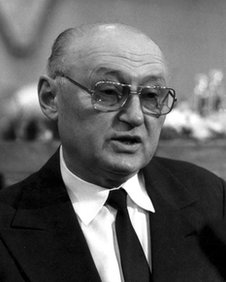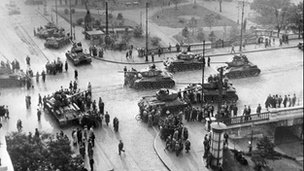
Hungary 1956 counter-revolutionary Bela Biszku arrested
Nick Thorpe BBC News, Hungary
A former interior minister of Hungary, Bela Biszku, who oversaw the crushing of the 1956 revolution, has been arrested on suspicion of war crimes.
He is the first of the 1956 Communist leadership to face a criminal inquiry.
Mr Biszku, 90, is accused of failing to protect civilians in wartime, and of responsibility for ordering security forces to open fire on crowds.
He denies the charges, for which he could face a life sentence. Prosecutors want him put under house arrest.
 Bela Biszku is the last surviving member of the communist leadership
Bela Biszku is the last surviving member of the communist leadership
"Today...prosecutors have detained and heard as a suspect Bela Biszku, one of the key designers and one of those responsible for the reprisals that followed the 1956 revolution and uprising," said Budapest's acting chief prosecutor, Tibor Ibolya.
Mr Biszku is the only surviving member of the Communist Party's interim executive committee from 1956.
The uprising against Hungary's communist dictatorship and its submission to the Soviet Union began in October of that year and toppled the government. But within three weeks it was crushed by a Soviet invasion.
'Good shape'
Mr Biszku is accused of responsibility for ordering the security forces to open fire on crowds in Budapest and Salgotarjan in November and December 1956. About 50 people were killed in those two incidents alone.
Further charges, relating to his role in allegedly interfering with the courts to ensure heavy sentences, including the death sentence for the revolutionaries, may be added. At least 226 people were executed.
Two days before his 91st birthday, Bela Biszku went quietly when police officers came to his home on Monday morning.

Mr Ibolya said he was in good physical shape, but he had refused to make a statement to prosecutors.
One of the mysteries of the case is exactly why it has taken so long. It is 22 years since the fall of communism, and 44 years since Hungary signed the 1968 New York Convention on bringing those responsible for war crimes to justice.
In 2011 the so-called Biszku Law was drawn up, allowing for the 1968 New York Convention to be incorporated into Hungarian law.
In February this year, the Budapest Prosecution Service began an investigation, in reaction to an individual complaint against him.
Asked by the BBC to explain the timing of Mr Biszku's arrest, the chief prosecutor mentioned the change in the law.
The arrest comes soon after the detention, then release into house arrest, of 97-year-old Laszlo Csatary, the former police chief of the Jewish ghetto in Kosice, who oversaw both the ghetto and the deportations to Auschwitz in the spring of 1944.
Adam Gellert, an expert in international criminal law who helped draw up the new legislation, said: "What the two cases have in common is that in both there is evidence of state-organised terror, and state-organised crimes.
"These cases should be treated on an equal footing, and should be publicised as much possible."
http://www.bbc.co.uk/news/world-europe-19546237
